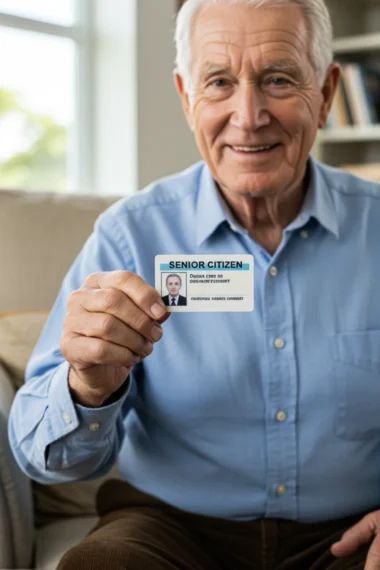Driver’s License Renewal For Seniors – Complete Guide for U.S. Drivers Over 65
According to the Federal Highway Administration, more than 48 million licensed drivers in the U.S. are aged 65 and older as of 2023. That’s about 1 in every 5 drivers on the road.
For seniors, holding a valid driver’s license is more than a legal requirement—it’s about preserving freedom, self-sufficiency, and staying connected to family, doctors, and community.
DMV rules aren’t exactly senior-friendly. They vary by state, age, and medical history. Some states shorten license validity after age 65. Others require in-person renewals, vision tests, or even driving exams.
Who Is Considered a Senior Driver in the U.S.?
There’s no one-size-fits-all definition, but here’s how most U.S. DMVs categorize senior drivers:
| Age Bracket | DMV Classification | Notes |
|---|---|---|
| 60-64 | Pre-senior | Some states begin applying vision checks |
| 65-69 | Senior | May require shorter renewal periods |
| 70-74 | Older Senior | In-person renewals often required |
| 75+ | High-Risk Senior | Mandatory road tests in select states |
Example:
In California, drivers over 70 must renew in person, while in Illinois, those 75 and older must take a behind-the-wheel test at every renewal.
Why Are Senior Drivers Treated Differently?
Aging brings changes—whether we like it or not. The following factors often trigger stricter renewal policies:
- Declining vision (especially night vision)
- Slower reaction times
- Chronic health conditions (diabetes, arthritis, dementia)
- Increased accident risk after age 75
According to the Insurance Institute for Highway Safety (IIHS), drivers over 80 have a higher crash fatality rate than younger drivers, despite driving fewer miles.
This doesn’t mean seniors are bad drivers—it means the system needs to ensure you’re safe, confident, and aware behind the wheel.
Step-by-Step Guide: Driver’s License Renewal for Seniors
Step 1: Check Your State’s DMV Rules
Every state has its own Department of Motor Vehicles (DMV) or equivalent, and the requirements vary. Some states require seniors to renew more frequently or take vision tests more often.
For example:
- California: Seniors 70+ must renew in person.
- Illinois: Drivers 75+ must pass a road test at every renewal.
- Florida: Vision tests required at age 80+.
Step 2: Note Your Renewal Schedule
States may shorten the license validity for seniors. Here’s a state by state renewal schedule:
| State | Age of Shortened Renewal | Renewal Frequency | Special Requirements |
|---|---|---|---|
| Alabama | 65 | Every 4 years | Vision test may be required in-person |
| Alaska | 69 | Every 5 years | Vision test required at 69+ |
| Arizona | 65 | Every 5 years | Vision test required |
| Arkansas | 70 | Every 4 years | In-person renewal after 70 |
| California | 70 | Every 5 years | In-person required at 70 |
| Colorado | 66 | Every 5 years | Vision test and in-person preferred |
| Connecticut | 65 | Every 2–6 years | Optional 2-year license at age 65+ |
| Delaware | 65 | Every 8 years | No senior-specific rules |
| Florida | 80 | Every 6 years | Vision test required |
| Georgia | 64 | Every 8 years | No special requirements |
| Hawaii | 72 | Every 2 years | Vision test and in-person required |
| Idaho | 63 | Every 4 years | In-person required at 70+ |
| Illinois | 75 | Every 4 years | Road test required at 75+ |
| Indiana | 75 | Every 3 years (75–84), every 2 (85+) | Vision test at every renewal |
| Iowa | 70 | Every 2 years | Vision test required |
| Kansas | 65 | Every 4 years | Vision test required |
| Kentucky | 70 | Every 4 years | In-person only |
| Louisiana | 70 | Every 6 years | In-person renewal |
| Maine | 65 | Every 4 years | Vision test every renewal 65+ |
| Maryland | 40 | Every 5–8 years | Vision screening every renewal 40+ |
| Massachusetts | 75 | Every 5 years | In-person and vision required |
| Michigan | 65 | Every 4 years | No mandatory in-person |
| Minnesota | 65 | Every 4 years | No senior-specific rules |
| Mississippi | 65 | Every 8 years | In-person renewal |
| Missouri | 70 | Every 3 years | In-person and vision required |
| Montana | 75 | Every 4 years | In-person and medical review may apply |
| Nebraska | 72 | Every 5 years | Vision test required |
| Nevada | 65 | Every 4 years | In-person and vision test |
| New Hampshire | 75 | Every 5 years | Road test may be required |
| New Jersey | 70 | Every 4 years | In-person preferred |
| New Mexico | 67 | Every 4 years (4-year license only) | Vision test required |
| New York | 65 | Every 8 years | Eye exam must be submitted |
| North Carolina | 66 | Every 5 years | Vision screening required |
| North Dakota | 78 | Every 4 years | Vision test required |
| Ohio | 65 | Every 4 years | No online renewal for seniors |
| Oklahoma | 62 | Every 4 years | Vision test required |
| Oregon | 50 | Every 8 years | No special senior rules |
| Pennsylvania | 65 | Every 4 years | Vision test at certain ages |
| Rhode Island | 75 | Every 2 years | In-person and vision test |
| South Carolina | 65 | Every 5 years | Vision test at every renewal |
| South Dakota | 65 | Every 5 years | Vision test every renewal |
| Tennessee | 65 | Every 5–8 years | In-person renewal required |
| Texas | 79 | Every 6 years | In-person and vision required |
| Utah | 65 | Every 5 years | Vision test every renewal |
| Vermont | 65 | Every 4 years | In-person required |
| Virginia | 75 | Every 5 years | In-person and vision required |
| Washington | 70 | Every 6 years | In-person and eye exam recommended |
| West Virginia | 70 | Every 5 years | Vision test required |
| Wisconsin | 65 | Every 8 years | Vision test required at renewal |
| Wyoming | 65 | Every 5 years | Vision test required |
Learn More: Sign Up for Social Security Retirement: A Step-by-Step Guide
Step 3: Schedule a Vision Test (If Required)
Over 30 states mandate a vision screening during license renewal after a certain age. If your vision is corrected with glasses or contacts, bring them to the test.

Some states allow your eye doctor to submit results directly to the DMV. Minimum vision requirements typically include:
- 20/40 or better in at least one eye
- Peripheral vision of 140 degrees
Step 4: Prepare Your Documents
Here’s what you’ll likely need for in-person renewal:
- Current driver’s license
- Proof of identity (e.g., passport or birth certificate)
- Proof of Social Security number (e.g., SS card or W-2)
- Two proofs of residency (utility bill, lease, etc.)
- Glasses or contacts (if applicable)
- Renewal notice (if mailed)
Some states may require REAL ID compliance. Look for the gold star on your current license.
Step 5: Decide on the Renewal Method
Online Renewal:
Available in most states unless you are:
- Over a certain age (usually 70+)
- Due for a vision or written test
- Have a suspended or expired license
Mail Renewal:
Available in selected states for seniors under certain conditions (no medical flags, no address changes, etc.)
In-Person Renewal:
Mandatory in some states at certain age thresholds.
States like Illinois, California, and Texas require in-person renewals once you hit 70–80 years of age.
Step 6: Pass Any Required Tests
Possible Testing:
- Vision Test: Common across all states for seniors
- Written Test: Rare, unless renewal is long overdue
- Road Test: Required in states like Illinois for drivers aged 75+
Failing the vision test may require submitting a report from your eye doctor or undergoing further medical evaluation.
Step 7: Pay the Renewal Fee
Renewal fees range from $10 to $60, depending on the state.
| State | Senior Renewal Fee |
|---|---|
| Alabama | $36.25 (4 years) |
| Alaska | $20 (5 years) |
| Arizona | $25 (5 years for age 65+) |
| Arkansas | $40 (8 years; 70+ in-person) |
| California | $41 (5 years) |
| Colorado | $28 (5 years) |
| Connecticut | $72 (6 years) or $24 (2 years at 65+) |
| Delaware | $40 (8 years) |
| Florida | $54 (8 years) or $27 (4 years) |
| Georgia | $32 (8 years) |
| Hawaii | $20 (2 years at 72+) |
| Idaho | $30 (4 years at 63+) |
| Illinois | $30 (4 years at 75+) |
| Indiana | $17.50 (3 years at 75–84) or $7 (2 years at 85+) |
| Iowa | $32 (8 years; 70+ 2 years) |
| Kansas | $24 (6 years under 65; 4 years $20 at 65+) |
| Kentucky | $48 (8 years) or $24 (4 years at 70+) |
| Louisiana | $32.25 (6 years at 70+) |
| Maine | $30 (4 years at 65+) |
| Maryland | $72 (8 years) or $54 (6 years) |
| Massachusetts | $50 (5 years at 75+) |
| Michigan | $18 (4 years at 65+) |
| Minnesota | $32 (4 years at 65+) |
| Mississippi | $24 (4 years at 65+) |
| Missouri | $14 (3 years at 70+) |
| Montana | $41 (8 years; 4 years at 75+ $23) |
| Nebraska | $26.50 (5 years at 72+) |
| Nevada | $18.25 (4 years at 65+) |
| New Hampshire | $50 (5 years at 75+) |
| New Jersey | $24 (4 years) |
| New Mexico | $18 (4 years at 67+) |
| New York | $64.50 (8 years) |
| North Carolina | $32 (8 years; $16 for 5 years at 66+) |
| North Dakota | $15 (4 years at 78+) |
| Ohio | $27.25 (4 years at 65+) |
| Oklahoma | $38.50 (4 years at 62+) |
| Oregon | $60 (8 years) |
| Pennsylvania | $39.50 (4 years at 65+) |
| Rhode Island | $32.50 (2 years at 75+) |
| South Carolina | $25 (5 years at 65+) |
| South Dakota | $28 (5 years at 65+) |
| Tennessee | $28 (5 years at 65+) |
| Texas | $33 (6 years at 79+) |
| Utah | $52 (8 years; $26 for 5 years at 65+) |
| Vermont | $32 (4 years at 65+) |
| Virginia | $32 (5 years at 75+) |
| Washington | $54 (6 years at 70+) |
| West Virginia | $10 (2 years at 70+) |
| Wisconsin | $34 (8 years at 65+) |
| Wyoming | $30 (5 years at 65+) |
Some low-income seniors may qualify for discounted or waived fees through local aging agencies or state disability programs.
Step 8: Check for Driving Restrictions
Based on medical or vision tests, the DMV may add certain restrictions:
- Corrective lenses required
- Daylight-only driving
- No freeway driving
- Driving within specific areas only
These restrictions help you stay safe and legally compliant.
Step 9: Receive Your New License
After completing the renewal:
- You’ll receive a temporary license immediately
- The official license will arrive by mail within 2 to 6 weeks
Make sure your address is current—licenses are often delayed or returned if addresses don’t match DMV records.
Senior-Friendly DMV Services
Some states offer senior-specific DMV services:
- Priority appointments
- Shorter wait times
- Vision reporting through doctors
- Ombudsman programs (CA)
- Mobile DMV vans for rural seniors
Common Driving Restrictions for Seniors
You may still drive, but under restrictions such as:
- Daytime only
- No freeway
- Must wear corrective lenses
- Geographic limits (e.g., within 20 miles)
Tips for Smooth License Renewal
- Get an eye exam 1–2 months before your renewal
- Renew early (some states allow up to 6 months in advance)
- Bring original documents—no copies!
- Ask a family member to accompany you
- Take a defensive driving course for bonus confidence
Take a Defensive Driving Course (And Save Money)
Available both online and in-person. AARP offers one of the most popular courses.
Bonus:
Insurance providers often offer 10–15% discounts on premiums to seniors who complete approved courses.
What If You’re Denied a Renewal?
If the DMV denies your renewal:
- Request a hearing or appeal
- Submit a medical evaluation form
- Retake the road test or vision exam
- Contact legal aid if you feel discriminated against
Medical Review Boards – What They Do?
Many states have Medical Review Boards (MRBs) that assess:
- Stroke recovery
- Seizures
- Dementia or Alzheimer’s
- Diabetes (especially with blackouts)
If flagged, the MRB may:
- Suspend your license
- Require periodic health reporting
- Impose driving restrictions
What About the REAL ID?
Starting May 7, 2025, all air travelers will need a REAL ID to fly domestically.
To get one, you need:
- Proof of identity
- SSN verification
- 2 Proofs of residency
If your current license lacks a star in the corner, it’s NOT a REAL ID.
When Driving Isn’t an Option: Alternatives for Seniors?
If it’s time to hang up the keys, consider:
- Rideshare (Uber/Lyft with senior training)
- Local paratransit services
- Senior center vans
- Public bus discounts
- Volunteers for seniors (e.g., Meals on Wheels transportation help)
Final Thoughts
For seniors across the United States, driving isn’t just a mode of transport—it’s a way to stay connected, independent, and engaged. But staying safe behind the wheel means following the rules and knowing when to ask for help.
This guide covered the step-by-step process, documents, vision tests, state differences, and practical tips to help you—or a loved one—navigate senior license renewal with ease.
FAQs
Can seniors renew their license online?
Yes, but only in states that allow it and usually only if no vision or medical test is due.
How often do seniors need to renew their license?
Typically every 4–6 years, but this varies by age and state.
Do seniors need to take a driving test?
In most cases, no. However, Illinois requires road tests for drivers 75 and older.
Is there an age when seniors must stop driving?
No, but the DMV may evaluate your ability to drive safely after medical incidents or at a doctor’s request.
Can a doctor report an unsafe senior driver?
Yes, in many states doctors, police, or family members can file a confidential report to the DMV for evaluation.










